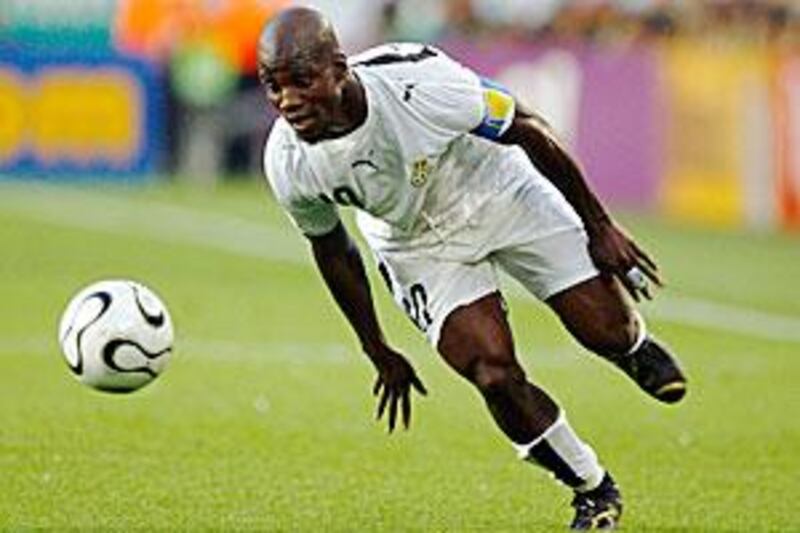Stephen Appiah's parents, Bartholomew and Comfort, will not watch this year's African Cup of Nations with much enthusiasm. Their son will not be part of Ghana's squad as he recovers from a right leg injury. He also missed the previous tournament, in 2008, through injury, and they are now hoping he can be fit for the World Cup.
They never wanted to stand in their son's way. Not when, at the age of 11, he told them he wanted to quit school to pursue football. They tried to dissuade him, after all, this is not what nice middle-class children with middle-class parents in middle-class jobs (bank teller and store manager) did. But when they saw he was happiest on a pitch, chasing a football, they relented. After all, what is the point of working hard and giving your children opportunities if then you don't let them follow their dream, however improbable it may seem?
All they asked of him was that, if he was to make it his career, he put his heart and soul into it. And he certainly did. He starred for Ghana in the Under 17 World Cup, a 14-year-old boy among men three years his senior. It was enough to earn him a trial with Galatasaray and his parents encouraged him to go all the way to Turkey to prove his worth. It did not work out, but, a year later, after another stand-out international performance (this time with Ghana's Under 20 side at the World Cup in Malaysia, again playing with guys three years his seniors), he was selected by Udinese.
A few months with the youth team, and he was out there, barely 17, standing toe-to-toe with the Serie A giants. The following season, 1998-99, he was slowed by injury, but still confirmed what everybody knew: the future was bright, very bright. In the spring, he headed out to the Under 20 World Cup in Nigeria. Ghana were knocked out in the quarter-finals on penalties by a Spain side who included the likes of Iker Casillas, Carlos Marchena and Xavi. As heart-breaking as the defeat was, it was nothing compared to what happened next.
Upon his return, Udinese dis- covered he had contracted Hepatitis B. He missed most of the following season, but that did not stop Parma from shelling out some £8.5million (Dh49.7m) to secure his services, making him the most expensive Ghanaian player in history - a record since broken by Michael Essien and Sulley Muntari. Things did not quite work out at Parma, an old knee injury limiting him to just 15 Serie A starts over two seasons.
His talent was not in question, his durability was. Parma felt he needed a shop- window and, in the summer of 2002, he was loaned to Brescia. He turned in a sparkling season, establishing himself as one of the best box-to-box midfielders in Serie A. Juventus swooped and Marcello Lippi made him the linchpin of his midfield. He again was one of the better midfielders in Serie A in his first season, but, after Lippi was replaced by Fabio Capello in the summer of 2004, things soured and, by Christmas he had lost his place.
Capello invited him to stay and compete for a spot in the side, he declined, saying he just wanted to play. So on he moved, this time to Fenerbache, for £7m. Istanbul suited him, as he helped the club win the league in his debut season there, winning the Footballer of the Year award in Turkey along the way. Another solid campaign followed, but then, in December 2007, during his third season at Fenerbache, he suffered a bad knee injury.
Fenerbache's medical staff convinced themselves he was never coming back. The club cancelled his contract that summer. He spent the next year doing rehabilitation work and going on trial with half a dozen clubs. But there were no takers: the knee simply did not look right. A boost came from the Ghanaian FA who called him up in the summer and restored him to the captaincy. He was a key figure for the Black Stars in World Cup qualifying but, still, he could not find a club. European football had seemingly banished him.
Only Africa still believed. He was good enough to play for a side who had breezed through World Cup qualifying, but, evidently, not a league club. The paradox was put to rest in early November, when Bologna picked him up as a free agent. A long and difficult battle to avoid relegation awaits him, as well as the twin challenges of the African Nations' Cup and the 2010 Fifa World Cup. But that's okay because this is what he wants.
This is what he dreamed of so many years ago when he decided to pursue his dream of playing professional football, with a bit of help from parents, Bartholomew and Comfort. Now, it's up to him. The best player to miss out on the African Cup of Nations could yet become one of the stars of this summer's World Cup. Ghana v Togo, KO 10.30pm on Monday, Aljazeera Sport +9





